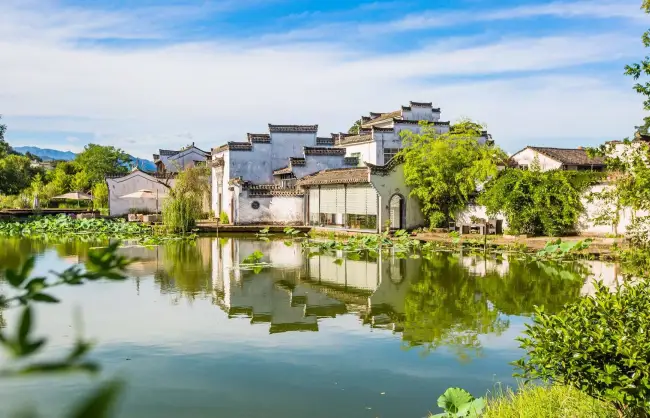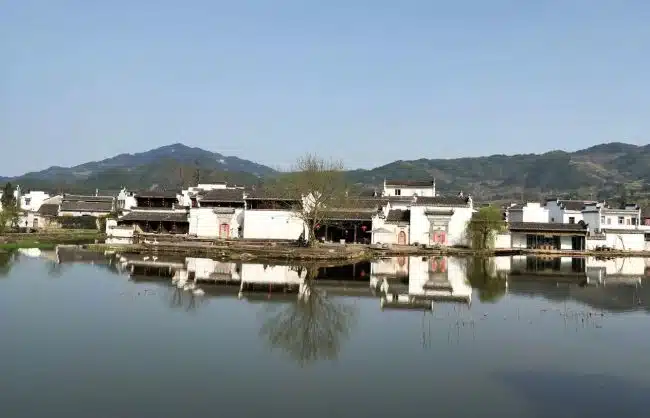Chengkan Village, also known as Longxi or Eight Diagram Village, is known as the No.1 village of Jiangnan, the township of ancient Chinese architecture and the best tourist town in Anhui province. Located at the southern foot of Yellow Mountain, Chengkan Village integrates the natural and cultural landscape for a memorable Huangshan Travel.
There are not only beautiful mountains and placid river, but also a great number of cultural heritages and a lot of eminent people in many fields. For example, more than 30 plaques inscribed by Dong Qichang who is the renowned painter and calligrapher in ancient time are left here. And since the Song dynasty, the culture and education here have been flourished as a result of the increasing importance of Huizhou merchants.
Chengkan Village Facts
- Type:Village, Historic Site
- Price of ticket:107 yuan
- Opening time:7:30-18:00
- Best Time to Visit: Spring &Autumn
- Recommended Visiting Hours: about 2hours
- Address: Chengkan Village, Huizhou District, Huangshan, Anhui Province, China

Things to Learn about Chengkan Village
Chengkan Village History
Chengkan village was first built in the Han dynasty. However, as early as the Neolithic age, there were traces of human activities. Relics of eminent bronze culture of the Zhou dynasty could also be found here. And Shanyue people once lived here in a lifestyle of slash-and-burn cultivation.
Chengkan Village Art
Based on the theory that the unity of Yin (kan)and Yang (cheng) lead tothe unity of man and nature” in The Book of Changes, the layout and construction of Chengkan follow the rules of eight diagrams. In addition, the clear and placid Longxi river flowing from north to south like a soaring dragon, which is regarded as the boundary of Ying and Yang in the eight diagrams. And there are eight mountains standing in different directions, which are regarded as the eight orientation of the eight diagrams. The ingenious layout integrating human and natural eight diagrams makes Chengkan Village be regarded as a geomantic treasure land of Huizhou.
While wandering through Chenkang Village in Anhui, one can fully appreciate the ancient, grand, beautiful, and elegant architecture of Huizhou culture. The exquisite craftsmanship of these buildings can be deeply explored to understand the ingenuity and philosophy of the craftsmen, and to feel their romantic expression and emotional investment in nature and life.
Chengkan Village Value
Nowadays, Huangshan Chengkan Village still completely preserves some unearthed neolithic, bronze ware and national key cultural relics, three main streets and ninety-nine lanes in the Three Kingdoms period of the Han dynasty, as well as more than 180 ancient buildings and ancient sites of the Tang, Song, Yuan, Ming and Qing dynasties. It is worthy of being honored as “famous village of Chinese history and culture”, “hometown of ancient Chinese architecture”, “hometown of national treasure”, “best tourist town in China” and so on.

What to Do in Chengkan Village
Appreciating the Time-Honored Village Architecture
Chengkan Village boasts over 180 ancient buildings and sites from the Tang, Song, Yuan, Ming, and Qing dynasties. It is one of the best-preserved Ming Dynasty villages in China. The gray and white color scheme of Huizhou ancient architecture looks particularly pure and elegant in the summer.
Wandering Through the Historic Streets
The streets and alleys in Chengkan Village are entirely paved with granite slabs. The residential houses are closely packed and interconnected, creating a labyrinthine layout. Strolling through the streets, every step offers a new view. The first destination is the Yan Yitang, a quintessential Ming Dynasty Huizhou-style building.
Upon entering, the skylight in the courtyard offers a glimpse of the blue sky and white clouds. The objects arranged on the tables symbolize “a lifetime of peace.” The brick carvings, stone carvings, and wood carvings, all meticulously crafted, bear the marks of time and reflect the extraordinary craftsmanship of the artisans.
Feeling the Grandeur of Luo Dongshu Ancestral Hall
The Luo Dongshu Ancestral Hall is the largest artistic treasure in Chenkan Village. The hall is grand in scale and exquisitely constructed, embodying the essence of “antiquity, elegance, beauty, and grandeur.” It is a paragon of Huizhou ancient architecture in China and is acclaimed as the “First Ancestral Hall in Jiangnan.”
The ancestral hall is a symbol of family lineage. With four successive courtyards, each deeper layer feels like turning a page in a thick history book, revealing fascinating stories on every page.

When is the best time to visit?
The best time to visit the Chengkan Village is March to November. As during these months, the weather is pleasant and the natural landscape is fascinating. Particularly in April, Chenkang Village is bathed in the spring breeze, with rapeseed flowers blooming in competition. They form a picturesque scene with the Huizhou-style architecture of whitewashed walls and black tiles, creating a colorful and enchanting view. It makes Chengkan Village one of the must-visit spring destinations for a Huangshan tour recommended in thousands of notes on social media platforms.
How to get to the Chengkan Village?
Chenkang is located in Huizhou District, Huangshan City, Anhui Province. The direct bus is available at the Huangshan Coach Station. Visitors can take Bus No.3 at Huangshan Coach Station and get off at Chengkan Ancient Village Station.
For those driving, you can also take the National Highway 205 from Tangkou at the Huangshan North Gate, passing through Qiankou to reach Chenkang. This section features mountainous and winding route, offering beautiful scenery and an exciting drive. Along the way, you will also find the Fengle Reservoir and hydropower station.
Nearby Attractions
- Tangmo Scenic Area:A national 5A-level tourist attraction and an ancient village tourist area characterized by its waterside entrance, Huizhou-style gardens, and water town scenery.
- Huizhou Ancient City: A national historical and cultural city. One of the “four best-preserved ancient cities”alongside Langzhong in Sichuan, Lijiangin Yunnan, and Pingyao in Shanxi as one of the “four best-preserved ancient cities.”
- Tangyue Archway Group: A representative collection comprising seven archways built during different periods of the Ming and Qing dynasties.









